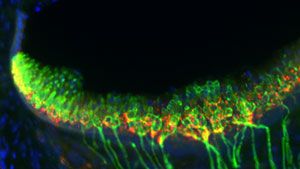
The Department of Special Education and Communication Disorders is pleased to host Dr. Chris Holt from the University of Rochester Medical Center. Dr. Holt earned his PhD in pharmacology and toxicology from Tulane University School of Medicine. He studies synaptic pharmacology of the vestibular apparatus. Many sensory systems are endowed with efferent feedback mechanisms that can modulate their primary input to the brain. That is, incoming information from a peripheral detector is delivered to a way station within the central nervous system whose output then modifies subsequent information coming from that same detector. Everyday examples include the pupillary reflex to bright light entering the eyes, the contraction of middle ear muscles to loud sounds, or the recruitment of additional muscle fibers when first lifting a heavy object. Here, the function of these efferent loops is presumably to optimize or tune each sensory modality to its stimulus. Additionally, these efferent pathways may also provide the appropriate circuitry for interactions with other sensory systems. Sensory information regarding the position and movement of the head are encoded by the vestibular system, which begins as a number of small detectors called hair cells located within the inner ear. Like the preceding examples, the peripheral vestibular system is also endowed with a prominent efferent innervation. The functional role of this feedback system, however, is relatively unknown.
Dr. Holt will present his research seminar on Friday, November 22, from 12 noon to 1pm in Barkley Room 321.